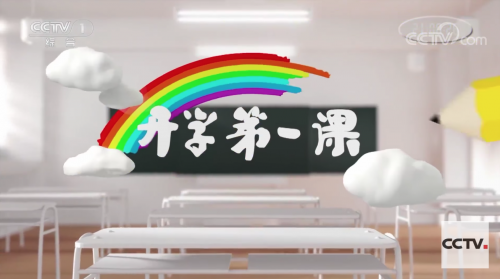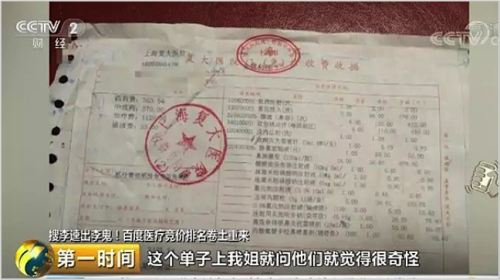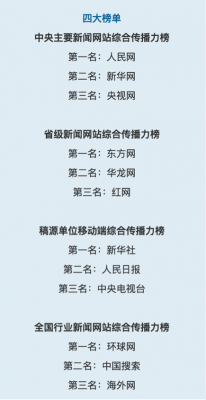Screenshot of CCTV coverage of Shanghai’s “Fuda Hospital,” to which unsuspecting patients were directed through online searches.
Baidu’s reputation suffered a serious blow back in 2016, when it was found that its search engine brought up misleading results directing patients to dangerous experimental treatments. In one prominent case, those results allegedly contributed to the death of a college student direct to an experimental cancer treatment.
Key Chinese Sources:
CCTV Online (央视网): 百度医疗竞价排名卷土重来?患者搜索医院遭遇“冒牌货”
And: [第一时间]搜李逵出李鬼!百度医疗竞价排名卷土重来 搜复旦附属医院却引来复大医院
The Paper (澎湃新闻网): 患者搜复旦附属医院被引入民营医院就诊,百度回应
And: 百度回应复大医院推广事件:将扩展品牌保护关键词库
[3] China Internet Media Forum Held, Releases Rankings
On September 6, 2018, the China Internet Media Forum was held in the city of Ningbo. The forum release a ranking of top sites in China in 2018 based on “communication power,” or chuanboli (传播力). Among official central-level news sites, the website of the People’s Daily was ranked at the top, with the sites of Xinhua News Agency and China Central Television coming in second and third. Among provincial-level news sites, eastday.com, a site operated by the leadership in Shanghai municipality, was ranked on top, with Chongqing’s cqnews.net coming in second, followed by rednet.cn from Hunan province.
Coverage of the rankings provided little in the way of supporting data, and it should be little surprise that the website operated under the banner of the Chinese Communist Party’s flagship newspaper, the People’s Daily, should be ranked first among “chief central media” — regardless of what the real numbers reflect.
Sun Yusheng (孙玉胜), the deputy director of China Central Television, opened the event with a speech in which he affirmed the key role of film and video, saying that its premier media status had not changed in the past 100 years and would not change in the future, though the channels themselves might change.
Key Chinese Sources:
WeChat public account “New Media” (微信公众号“网络传播杂志”): 2018中国网络媒体论坛成功举办 带你全程回顾!
WeChat public account “Media Circle” (微信公众号“传媒圈”): 孙玉胜:视频是传播的最高形态 未来也不会改变
[4] Shanxi Province Initiates Propaganda Campaign to “Sweep Away Organized Crime”
Lian Yiming (廉毅敏), the top propaganda leader of Shanxi province, held a meeting on September 7 called the “Sweeping Away the Black Concerted Struggle Propaganda Work Promotion Conference” (扫黑除恶专项斗争宣传工作推进会), which aimed at a coordinated series of propaganda reports dealing with the fight against organized crime. Lian demanded that propaganda officials at all levels across the province define propaganda reports on the struggle against organized crime as a “critical political task.”
Shanxi has sought in recent months to grapple with its reputation as a hotbed of official corruption. In 2015, Chinese Vice-Premier Ma Kai described the problem of corruption in the province as being “like a cancer.”
Key Chinese Reports:
WeChat public account “Shanxi Broadcast Television” (微信公众号“山西广播电视台”): 我省对深入推进扫黑除恶专项斗争宣传工作作出安排部署
Xinhua News Agency (新华网): 中央派出10个督导组实地“督战”扫黑除恶专项斗争
Baidu’s reputation suffered a serious blow back in 2016, when it was found that its search engine brought up misleading results directing patients to dangerous experimental treatments. In one prominent case, those results allegedly contributed to the death of a college student direct to an experimental cancer treatment.
Key Chinese Sources:
CCTV Online (央视网): 百度医疗竞价排名卷土重来?患者搜索医院遭遇“冒牌货”
And: [第一时间]搜李逵出李鬼!百度医疗竞价排名卷土重来 搜复旦附属医院却引来复大医院
The Paper (澎湃新闻网): 患者搜复旦附属医院被引入民营医院就诊,百度回应
And: 百度回应复大医院推广事件:将扩展品牌保护关键词库
[3] China Internet Media Forum Held, Releases Rankings
On September 6, 2018, the China Internet Media Forum was held in the city of Ningbo. The forum release a ranking of top sites in China in 2018 based on “communication power,” or chuanboli (传播力). Among official central-level news sites, the website of the People’s Daily was ranked at the top, with the sites of Xinhua News Agency and China Central Television coming in second and third. Among provincial-level news sites, eastday.com, a site operated by the leadership in Shanghai municipality, was ranked on top, with Chongqing’s cqnews.net coming in second, followed by rednet.cn from Hunan province.
Coverage of the rankings provided little in the way of supporting data, and it should be little surprise that the website operated under the banner of the Chinese Communist Party’s flagship newspaper, the People’s Daily, should be ranked first among “chief central media” — regardless of what the real numbers reflect.
Sun Yusheng (孙玉胜), the deputy director of China Central Television, opened the event with a speech in which he affirmed the key role of film and video, saying that its premier media status had not changed in the past 100 years and would not change in the future, though the channels themselves might change.
Key Chinese Sources:
WeChat public account “New Media” (微信公众号“网络传播杂志”): 2018中国网络媒体论坛成功举办 带你全程回顾!
WeChat public account “Media Circle” (微信公众号“传媒圈”): 孙玉胜:视频是传播的最高形态 未来也不会改变
[4] Shanxi Province Initiates Propaganda Campaign to “Sweep Away Organized Crime”
Lian Yiming (廉毅敏), the top propaganda leader of Shanxi province, held a meeting on September 7 called the “Sweeping Away the Black Concerted Struggle Propaganda Work Promotion Conference” (扫黑除恶专项斗争宣传工作推进会), which aimed at a coordinated series of propaganda reports dealing with the fight against organized crime. Lian demanded that propaganda officials at all levels across the province define propaganda reports on the struggle against organized crime as a “critical political task.”
Shanxi has sought in recent months to grapple with its reputation as a hotbed of official corruption. In 2015, Chinese Vice-Premier Ma Kai described the problem of corruption in the province as being “like a cancer.”
Key Chinese Reports:
WeChat public account “Shanxi Broadcast Television” (微信公众号“山西广播电视台”): 我省对深入推进扫黑除恶专项斗争宣传工作作出安排部署
Xinhua News Agency (新华网): 中央派出10个督导组实地“督战”扫黑除恶专项斗争
























